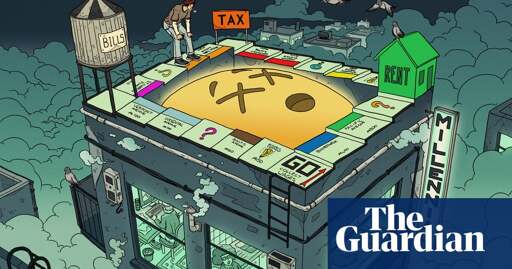Claire*, 42, was always told: “Follow your dreams and the money will follow.” So that’s what she did. At 24, she opened a retail store with a friend in downtown Ottawa, Canada. She’d managed to save enough from a part-time government job during university to start the business without taking out a loan.
For many years, the store did well – they even opened a second location. Claire started to feel financially secure. “A few years ago I was like, wow, I actually might be able to do this until I retire,” she told me. “I’ll never be rich, but I have a really wonderful work-life balance and I’ll have enough.”
But in midlife, she can’t afford to buy a house, and she’s increasingly worried about what retirement would look like, or if it would even be possible. “Was I foolish to think this could work?” she now wonders.
She’s one of many millennials who, in their 40s, are panicking about the realities of midlife: financial precarity, housing insecurity, job instability and difficulty saving for the future. It’s a different kind of midlife crisis – less impulsive sports car purchase and more “will I ever retire?” In fact, a new survey of 1,000 millennials showed that 81% feel they can’t afford to have a midlife crisis. Our generation is the first to be downwardly mobile, at least in the US, and do less well than our parents financially. What will the next 40 years will look like?



Well exactly, it’s an uphill battle, sadly. I’ve been upset at how weak our media has been since the Bush years, when I was working in local television for an NBC affiliate. I got to see all the behind the scenes of the beginnings of the War on Terror and how much our media purposefully pumped up both the war in Afghanistan and in Iraq and how they helped promote the outright lies of the Bush administration. It was eye opening as a twenty-something to say the least and made me incredibly distrustful of government overreach that was being exhorted by patriotism and nationalism. “Spy and snitch on your fellow Americans to prove how patriotic you are!” It was also part of the beginning of dropping the facade of “racism being over” because holy fuck did brown skinned immigrants all get put in the “dangerous radical Islamist” basket, no matter their real nationality or religion. It deeply colored my view of mainstream media as consistently right-wing, even back then, because of how often they would capitulate to Republican lies to support wars intended to enrich a small elite.
I’ve been wanting to see more independently successful media organizations most of my life, but most of what I have seen is media consolidation, and it’s certainly not like I have the capital to get into the business myself. It’s brutal.
Finally, just as you said, we’re competing with Twitch and TikTok and a lot of these issues really require text documents and references that can be checked more easily than needing to sift through a three-hour-Youtube-video of the issue. The problem is we’ve raised a generation that really doesn’t want to read much at all if it isn’t a subtitle for a video. That’s… distressing. (But not to act like it was much better in my generation, it’s not, it’s part of why we have so many shitty kids: their shitty millennial parents who shove a phone into their hand like Boomers shoved us in front of TVs.)
I wouldn’t even know where to start on how to fix it. I’m with Marshall McLuhan, we’re spitting out new communications mediums before we’ve even really understood the social impacts of the previous mediums. He argued we still didn’t understand writing and we had already jumped headlong into radio and television… Well, look at us now baybeee, shit’s spiraling with the internet, McLuhan. Maybe he’s spinning in his grave to match.